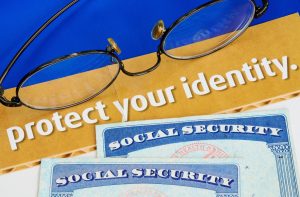Identity Theft
While the IRS has taken preventative high-security measures to prevent identity theft, and even though tax season is coming to a close, it’s important to remember that your information is out there in the world. Here are some additional ways to protect your privacy and avoid identity theft.
coming to a close, it’s important to remember that your information is out there in the world. Here are some additional ways to protect your privacy and avoid identity theft.
Don’t Accept Any Calls from the IRS
The IRS never calls or asks you for personal information over the phone. If they need to contact you, they will contact you by mail. The IRS does have a toll-free number. If you need to call them, reach dial 800-829-1040. Otherwise, you are not speaking with them on the phone. If you believe you are the victim of a scam call, contact the Treasury Inspector General for Tax Administration at 1-800-366-4484.
Wipe Your Web Page Data
Filing your taxes with online services like H&R, you need to make sure you clear out your cookies and reset your browser. Computer hackers are always looking for any scrap of information to steal your identity and potentially wipe out your accounts. Try to opt out of electronic communication when possible.
Don’t Log Into Your Tax Account in A Public Area
While cafes like Starbucks allow individuals to log in for free using your email and name, you should never log into your tax account in a computer cafe. Hackers can silently monitor your activity and watch you type in passwords, SSNs, pins, and personal information. Choose to stay home when you are working on anything financial on your computer.
Shred Tax Information Headed for the Trash
Any personal information headed for the trash needs to be shredded. Tax Season is the time resulting in the highest amounts of identity theft. Much of identity theft is preventable. The most obvious way to protect your identity is not to leave paperwork around. Scam artists are always looking for low-hanging fruit. They know that this time of year people are filing sensitive information.
Set Up an Identity Protection Program
Identity protection programs like Lifelock©, Privacy Guard©, and IdentityForce© allow families to add personal information, protect devices, and set up emergency notifications. Subscribing to these programs does not guarantee that identity theft won’t happen, but it allows you to set up proper measures. These programs help you lessen the effects of identity theft and help you recover when you have fallen victim to it.
Open Emails with Caution
Never open strange emails. People tend to overlook this advice. The best way to check the validity of an email is to copy and paste the email address into a separate browser page. For emails claiming to give away free prizes, check the email address to see if the company email address is an exact match to the company they claim to be.
Preventing identity theft upfront is easier said than done. Contact the Federal Trade Commission or your State Agency if you believe you are a victim of identity theft. Keep in mind that scammers online may be in different countries. You may need to escalate your case to the FBI’s Internet Crime Complaint Center. Speak with your attorney if you are the victim of a scam.
Sources – Welcome to FBI.gov — FBI – Identity Theft | Consumer Information (ftc.gov) – Best Identity Theft Protection 2022 – Compare Identity Theft Protection Review (identityprotectionreview.com) – It’s Accrual World: Why Tax Season Is High Time for Fraud | Flashpoint (flashpoint-intel.com) – H&R Block Privacy Practices | H&R Block® (hrblock.com) – Don’t Fall for Scam Calls and Emails Impersonating IRS | Internal Revenue Service – Facts + Statistics: Identity theft and cybercrime | III
Lifelock©, Privacy Guard ©, and IdentityForce © are copyrighted companies that provide identity protection. Franek Tax Services LLC. has no affiliation with these programs and does not guarantee their products.
